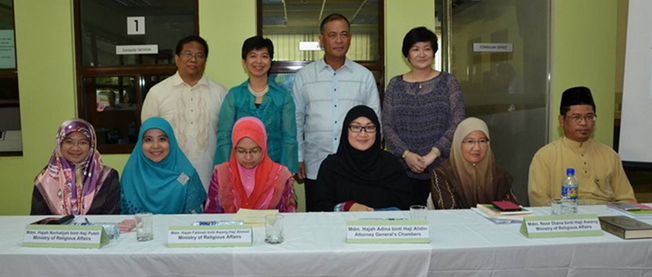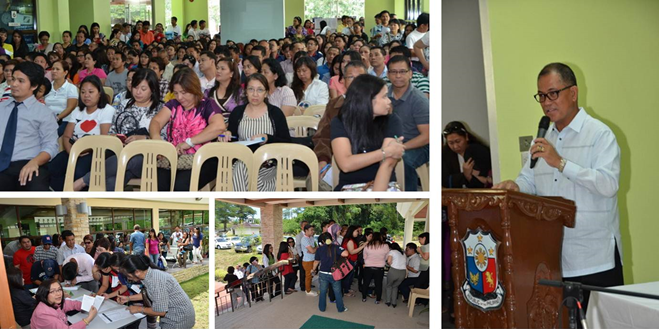
The Philippine Embassy in Brunei Darussalam held a briefing on Shariah Law for members of the Filipino Community on February 27. The briefing was organized in cooperation with the Prime Minister’s Office (PMO).
In his welcome remarks, Ambassador Nestor Z. Ochoa noted that the Shariah Penal Code is a different legal system from the one practiced in the Philippines. He emphasized that as good visitors and responsible global citizens, “We Filipinos should take responsibility to educate ourselves on this new law and its effect on our everyday lives.”
Ambassador Ochoa further emphasized that “well-informed Filipino workers are empowered Filipino workers, able to make intelligent decisions for themselves, their families, and the people around them. The first step is to get all the relevant information, which is precisely what we aim to do with this briefing. I also humbly ask for your assistance in echoing the information here to other members of the Filipino community in Brunei,” he added.
More than 1,500 overseas Filipino workers (OFWs) and their families gathered in the Embassy to listen to a panel of resource speakers that included Mesdames Hajah Adina binti Haji Alidin (Legal Officer, Attorney General’s Chambers), Hajah Fatimah binti Awang Haji Ahmed (Deputy Shariah Prosecutor, Islamic Law Unit, Ministry of Religious Affairs), Noor Diana binti Haji Awang (Shariah Law Officer, Islamic Law Unit, Ministry of Religious Affairs), Hajah Norhatijah binti Haji Puteh (Shariah Law Officer, Islamic Law Unit, Ministry of Religious Affairs), Saadatul Nazaliah binti Haji Saiful Ashura (Shariah Law Officer, Islamic Law Unit, Ministry of Religious Affairs) and Ustadz Ali Hassan bin Mohammad Yassin (Education Officer, Islamic Dakwah Center, Minister of Religious Affairs).
The first phase of the implementation of the Shariah Law in Brunei Darussalam is scheduled for April 2014. The initial stage includes the implementation of all offences under Part IV Chapter IV of the Shariah Penal Code Order 2013 that are punishable by fine or imprisonment.
For Muslims, these include offenses such as failure to perform Friday prayers, non-payment of zakat or fitrah, and pregnancy out of wedlock, among others.
For non-Muslims, offences include disrespecting the holy month of Ramadan, indecent behavior, and cross-dressing, among others.
The second phase of the implementation of the Shariah Law is scheduled 12 months after the Shariah Courts Criminal Procedure Code is gazetted. This phase will see the implementation of all offences punishable by hadd, qisas, whipping, diyat and arsy except offences punishable by death. The draft Shariah Courts Criminal Procedure Code is currently being finalized by authorities.
The third phase, or full implementation of the Shariah Law in Brunei Darussalam, will be enforced 24 months after the Shariah Courts Criminal Procedure Code is gazetted, and will include all offences, including those punishable by death.
Photos and article courtesy of DFA press release, 06 March 2014.
